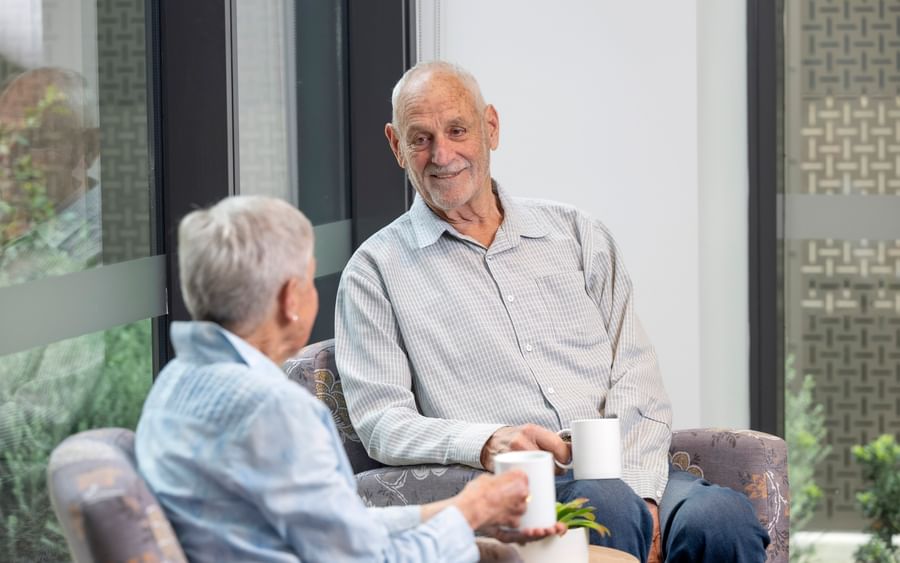What do I say?
Making the first contact may be the hardest part. But showing up for someone — even imperfectly — is often the most important thing.
It’s okay to start with:
- “I don’t know what to say.” You could follow up with “but thank you for sharing your news” or “I’m pleased you told me”.
- “How are you today?” gives them the opportunity to take the lead.
- Telling someone you’ve been thinking of them.
Some other helpful tips:
- Give them space to share as much or as little as they feel comfortable with.
- If they do open up to you, allow them to express feelings of anger, fear or sadness. You do not always have to be cheerful.
- It may feel like too little, but simply listening and allowing them to talk about their distress can offer relief.
- Actively listen when they are talking to you.
- Give them the opportunity to talk about cancer if they want to but distractions can be helpful too – take your cues from them. They may welcome the opportunity to talk about the things you usually do.
- Always remember to respect people’s confidentiality.
How can I show my support?
Every person and situation is different, but here are some general suggestions for ways you can show your support:
- Ask before visiting. Your friend may be feeling tired or unwell and have appointments. Let them know that saying no is okay.
- Keep the visit short if your friend is tired.
- Sometimes just sitting and spending time with your friend can be all that’s needed.
- Always ask if your children are welcome to come with you. If your children are unwell, it could be best to stay home and call instead.
- If they have family or an unpaid carer, talk with their carer so they can take a moment for themselves while you visit.
- Invite your friend out to things you have always done together but reassure them that it’s okay if they don’t feel up to it on the day.
- Offer to go for a brief walk with them.
How can I help?
Many people find it difficult to ask for help or mention tasks they need help with. When considering how you can help, ask yourself the following questions:
- Does the person want my help?
- Have I asked them what they would like assistance with?
- What can I do? What do I have time to do?
- Can I commit to seeing this task through?
Think about what you are good at and would like to offer. Some examples of help you can offer include:
- Feeding pets or walking the dog.
- Preparing a meal.
- Helping around the house e.g. making the bed, hanging out washing or helping with the ironing.
- Looking after the children, arranging school pick-up and drop-off, or arranging a roster of friends to provide support.
- Providing transport to appointments or for shopping.
- Helping to set up online shopping.
- Helping in the garden.
- Going for a walk with them.
- Offering to pick them up when you catch up for coffee or a meal.
- Offering to coordinate any sharing of information to family and friends.
If your offer of help is refused, don’t be offended. Ask again at another time. If you do agree to help or do a specific task, make sure you can see it through.
What not to do
You may have good intentions, but try to avoid repeating these common mistakes:
- Avoiding your friend or assuming they want to be left alone.
- Sharing information on social media without consent.
- Getting embarrassed or worried if either of you becomes upset.
- Telling them not to worry and that things will be fine.
- Assuming they can’t continue to work or do their usual activities.
- Telling them about cancer stories you have been told.
- Offering advice about diet or lifestyle, the latest cure or treatment you have heard about.
- Judging them for how they are reacting, behaving or feeling.
We’re here to support loved ones of people with cancer too
If the person affected by cancer is someone close to you, it may be a very upsetting time. If you are not sure what to do, it can help to talk about how you are feeling. Your partner, family members and friends can be a good source of support, or you may prefer to talk to a counsellor.
You can also call our qualified health professionals on 13 11 20 for support with what to say and how you can help. Learn more.
Cancer Council SA has a range of free resources and services designed to help people impacted by cancer work through the emotions that a diagnosis may bring.
You might be interested in
Other resources
-
Cancer Council Online Community – a 24/7 online forum for people impacted by cancer, their carers and families.
-
Gather My Crew – an app that makes organising care easy and organised.
-
Carers SA – support and resources for carers
-
Palliative Care Australia – get information about palliative care.
-
Canteen – provides free and tailored support to young people aged 12-25 who are impacted by cancer.


